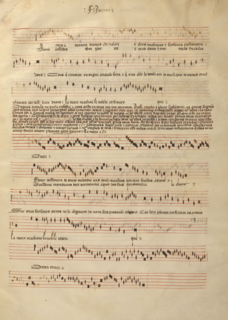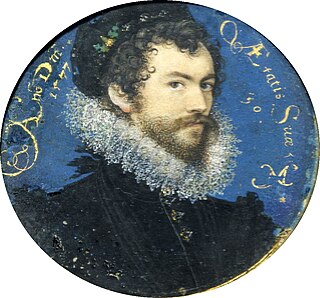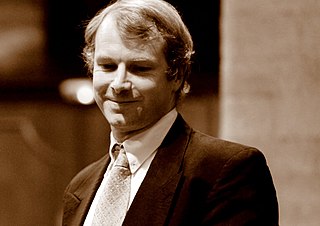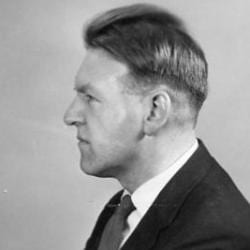Related Research Articles

Johannes Ockeghem was a Franco-Flemish composer and singer of early Renaissance music. Ockeghem was the most influential European composer in the period between Guillaume Du Fay and Josquin des Prez, and he was—with his colleague Antoine Busnois—the leading European composer in the second half of the 15th century. He was an important proponent of the early Franco-Flemish School.

Ars nova refers to a musical style which flourished in the Kingdom of France and its surroundings during the Late Middle Ages. More particularly, it refers to the period between the preparation of the Roman de Fauvel (1310s) and the death of composer Guillaume de Machaut in 1377. The term is sometimes used more generally to refer to all European polyphonic music of the fourteenth century. For instance, the term "Italian ars nova" is sometimes used to denote the music of Francesco Landini and his compatriots, although Trecento music is the more common term for the contemporary 14th-century music in Italy. The "ars" in "ars nova" can be read as "technique", or "style". The term was first used in two musical treatises, titled Ars novae musicae by Johannes de Muris, and a collection of writings attributed to Philippe de Vitry often simply called "Ars nova" today. Musicologist Johannes Wolf first applied to the term as description of an entire era in 1904.

F. Andrieu was a French composer in the ars nova style of late medieval music. Nothing is known for certain about him except that he wrote Armes, amours/O flour des flours, a double ballade déploration, for the death of Guillaume de Machaut in 1377. The work has been widely praised and analyzed; it is notable for being one of two extant medieval double ballades for four voices, the only known contemporary musical setting of Eustache Deschamps and the earliest representative of the longstanding medieval and Renaissance lamentation tradition between composers. He may be the same person as Magister Franciscus, although the scholarly consensus on this identification is unclear. With P. des Molins, Jehan Vaillant and Grimace, Andrieu was one of the "post-Machaut" generation whose pieces retain enough ars nova qualities to be differentiated from composers of ars subtilior.

The Hilliard Ensemble was a British male vocal quartet originally devoted to the performance of early music. The group was named after the Elizabethan miniaturist painter Nicholas Hilliard. Founded in 1974, the group disbanded in 2014.
In Renaissance music, the cyclic mass was a setting of the Ordinary of the Roman Catholic Mass, in which each of the movements – Kyrie, Gloria, Credo, Sanctus, and Agnus Dei – shared a common musical theme, commonly a cantus firmus, thus making it a unified whole. The cyclic mass was the first multi-movement form in western music to be subject to a single organizing principle.

Messe de Nostre Dame is a polyphonic mass composed before 1365 by French poet and composer Guillaume de Machaut. Widely regarded as one of the masterpieces of medieval music and of all religious music, it is historically notable as the earliest complete setting of the Ordinary of the Mass attributable to a single composer.
The Tournai Mass is a polyphonic setting of the mass from 14th-century France. It is preserved in a manuscript from the library of the Tournai Cathedral.
Pro Cantione Antiqua of London (PCA) is a British choral group which was founded in 1968 by tenor James Griffett, counter-tenor Paul Esswood, and conductor and producer Mark Brown. Their first concert was at St Bartholomew's, Smithfield with Brian Brockless conducting but, from an early stage, they were closely associated with conductor and musicologist Bruno Turner. Arguably, they were the leading British performers of a cappella music, especially early music, prior to the founding of the Tallis Scholars.
Over 40 settings of the Ordinary of the Mass using the tune L'homme armé survive from the period between 1450 and the end of the 17th century, making the tune the most popular single source from the period on which to base an imitation mass.
Capilla Flamenca is a vocal and instrumental early music consort based in Leuven, Belgium. The group specialises in 14th to 16th century music from Flanders and takes its name from the historical Flemish chapel, the choir of the court chapel of Emperor Charles V. When the emperor left Flanders in 1517, he took his best musicians with him to Spain to accompany him as "living polyphony".
Blue Heron, directed by Scott Metcalfe, is a professional vocal ensemble based in the Boston area. The ensemble presents an annual concert series in Cambridge, Massachusetts, and performs throughout New England as well as touring the US; it made its European debut in the United Kingdom in 2017.
Ensemble Organum is a group performing early music, co-founded in 1982 by Marcel Pérès and based in France. Its members have changed, but have included at one time or another, Josep Cabré, Josep Benet, Gérard Lesne, Antoine Sicot, Malcolm Bothwell. They have often collaborated with Lycourgos Angelopoulos and are influenced by Orthodox music.
Diabolus in Musica is a French medieval music ensemble based in Tours and directed by Antoine Guerber. Guerber studied medieval music under Dominique Vellard at the Centre de Musique Médiévale de Paris and at the Early Music Department of the Conservatoire National Supérieur in Lyon.
The Sound and the Fury is an Anglo-German vocal group convening in Brixen and Vienna, specialising entirely in performance of renaissance polyphony of the Franco-Flemish school.
Musica Ficta is a Danish choral group founded in 1996 by conductor and composer Bo Holten.
Missa Cuiusvis Toni is a four-part musical setting of the Ordinary of the Mass by the 15th-century composer Johannes Ockeghem. It is found in late-century manuscripts, including the Chigi codex, and was published in 1539, 42 years after the composer's death in 1497.
Antoine Sicot is a contemporary French soloist singer specialising in the baroque repertoire for bass voice.

Francis Jacob is a French organist and harpsichordist.
The Missa Mi-mi is a musical setting of the Ordinary of the Mass by Johannes Ockeghem. It is a motto mass based on one of Ockeghem's own chansons, "Presque transi." The mass contains several motives and ideas from this chanson beyond just the head-motive.

Gilbert Reaney was an English musicologist who specialized in medieval and Renaissance music, theory and literature. Described as "one of the most prolific and influential musicologists of the past century", Reaney made significant contributions to his fields of expertise, particularly on the life and works of Guillaume de Machaut, as well as medieval music theory.
References
- ↑ Gramophone - Volume 85, Issues 1027-1028 - Page 85 - 2008 "Intemerata Dei mater Ensemble Musica Nova / Lucien Kandel Aeon ... Ensemble Musica Nova are a mixed choir singing two-to-a-part in a sympathetic acoustic that allows for contrapuntal clarity and a sound image at once warm and bright.
- ↑ International Record Review - Volume 8, Issue 1 - Page 63 2007 -"Ensemble Musica Nova (Christel Boiron, Marie Claude Vallin, sopranos; Xavier Olagne, countertenor; Jeremie Couleau, Thierry Peteau, tenors; Marc Busnel, Guillaume Olry, basses)/ Lucien Kandel (countertenor). "